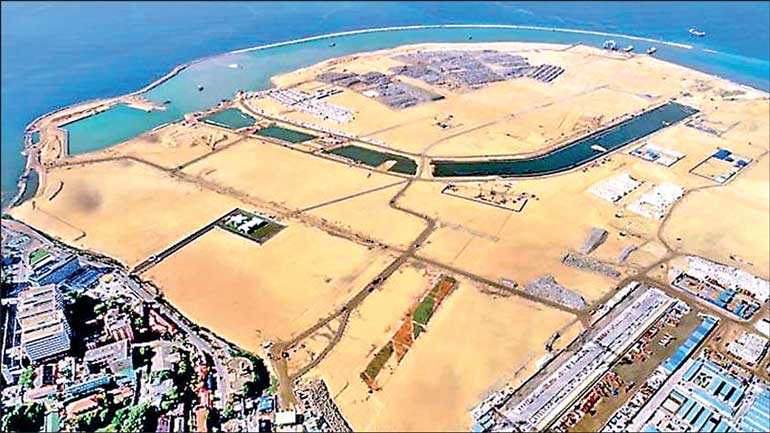Friday Feb 20, 2026
Friday Feb 20, 2026
Wednesday, 21 April 2021 00:00 - - {{hitsCtrl.values.hits}}

Port City
 Do the policy makers have the gift of foresight?
Do the policy makers have the gift of foresight?
The mountains were flattened and the sand was taken to reclaim the sea to erect a piece of real estate for foreigners to engage in business, entertainment and seek tax holidays. Environmental degradation, sea erosion, livelihood of fishermen, involvement of Catholic Church, and the devastation caused had been a cause of concern at the time the Port City began its construction but now it is a chapter in our history books.
The true picture of the documents, correspondence, agreements, novations, deeds, gazette notifications, public interviews by the Government Ministers and other documents and the correspondence the Government of Sri Lanka had with the China Harbour Corporation and the Government of China/Embassy of China in Sri Lanka, which have hitherto not been made public, will have to be placed before the International Court of Justice in Hague to resolve the sovereignty issue. May such a scenario never happen. Sri Lanka is a blessed land where Lord Buddha has thrice visited according to legend and Buddhism cherished and nourished. However political logic must prevail.
What would be the position after 99 years if the intended investment objective is not secured and advanced for any ulterior motive? Could anyone predict the global political landscape after 99 years? Could China or India purposely defeat the stated investment objective of the Port City through coercive diplomacy or through other manifestations either in favour or against political expediency of the political forces in Sri Lanka? Could China defeat the investment objective and make this a logistical hub for a different purpose?
String of Pearls strategy may be to encircle India but there could be yet another strategic purpose. Could China serve its navy operating in the Indian Ocean through a logistical hub of this magnitude? Closer to the vital sea lanes it can spread its hegemony and political influence and strategic objectives from this logistical hub. Do the agreements/contracts have clauses restricting the deviation from the investment objectives? If there are no such restrictions expressly given in the investment agreements then who could stop China from deviating from the investment objective? CICT terminal is just adjoining. There is strategic synergy.
The concern of Dr. Wijedasa Rajapaksha, PC could very well be justified. He claimed that Port City would one day be turned into a Chinese political entity. Who would be held responsible if such a scenario were to unfold? Would India
remain as strong as it is now? What would be the level of strength of the Union of India? When India weakens politically and militarily the Chinese coercive diplomatic power in the Indian Ocean region would be ‘a force multiplier’. Sri Lanka will then not be in a position to negotiate anything when the might is considered ‘right’. No one can predict global political manifestations in 10 years times let alone 99 years.
 |
| Elina Teplitz
|
Risk factors and the doctrine of the law of estoppel
The basic doctrine of the concept of an estoppel is that where a person (A) has caused another (B) to act on the basis of a particular state of affairs, A is prevented from going back on the words or conduct which led B to act on that basis, if certain conditions are satisfied. In such a scenario A is estopped (or ‘stopped’) from resiling from or contradicting the existence of that particular state of affairs. This is determined by the core issues governing the agreements, contracts, diplomatic correspondence between sovereign governments.
Could China Harbour pursue a legal remedy to secure their construction cost? Would Sri Lanka be in a position to repay the construction cost or barter the land in exchange for our debt? Will the Communist Party of China pass a resolution annexing the Port City as part of Sovereign territory of China? Who has capitalised the Construction Cost? If China Harbour Corporation has capitalised their construction cost in their Annual Reports then they have a claim over this territory under international law. Has the Attorney General of Sri Lanka in his Legal Opinion taken into consideration the International Legal aspects that would arise after 99 years vis-a-vis termination, cost of compensation, and extension by another 99 years and so on and so forth?
The legal status of the Port City has many ramifications which wades into international investment law and international politics, strategic balance hence this is unchartered water for Sri Lankans unless we plunge into water after gauging the depth of the waters. There has to be a wider discussion on the legal pitfalls that we will fall into and from which no can wriggle ourselves as no one can honestly predict the shift in global power politics. This writer feels that Port Commission Bill require a thorough scrutiny by experts and it would be prudent for the Government to withdraw the same and resubmit after being reviewed by legal experts with international law credentials.
Could China be trusted given the confrontations in South Pacific seas?
The track record of China in the South China Sea is far from being considered ‘a good neighbour’. China has claimed territories in the South China Sea and has forcibly occupied some of the islands claimed by other countries in the Pacific. The Philippines, Vietnam, Taiwan and Japan have had many territorial issues. There are daily encounters between Chinese Navy/Coast Guard and Navies of other countries in the Pacific. At the time of writing this article, there is flotilla of Chinese fishing crafts anchored near an Island claimed by Philippines. There have been close encounters in the skies over South Pacific.
The Chinese Air Forces jets have intercepted US Naval Surveillance aircrafts in a very unprofessional and unsafe manner risking lives of US servicemen. China and US are not at war, however the Chinese aggressive stance is not in keeping with the international norms and practices. US is bound to provide security guarantees to South Korea and Japan. US cannot simply be dislodged from Pacific there are treaty commitments in place to protect South Korea and Japan.
The supply chain of strategic commodities to South Korea and Japan must be defended either during peace time and war time. These vital sea lanes need constant protection. Could there be a time in the future when South Korean and Japanese fleets will have to be reflagged with US flag as has taken place in the Gulf War where Kuwait fleet were reflagged with US Flag.
Taiwan is bracing for an invasion by China. Indonesia had a sea confrontation with a Chinese fishing flotilla. Vietnam encountered a Chinese oil exploration rig being forcibly anchored in a disputed area a couple of years back. There are daily incursions of Chinese Air Force jets over the Air Defence Identification Zones of South Korea, Japan and Taiwan. China is a founding member of the United Nations and is bound by the international norms and practices. Its behaviour in the South China Sea is a far cry from what it stood for 70 years back when UN was established.
Money Laundering
The concern raised by the American Ambassador is a legitimate issue. The reason being that US has enacted laws with ‘extra-territorial’ reach. It can prosecute people beyond the shores of US, if anyone meddles with the international financial and banking system. For Americans their banking and financial system is a precious asset therefore they cannot stand any government with autocratic or authoritarian tendencies. Such governments are prone to protect suspects from being investigated or prosecuted by the US Government.
One case in point is a Hacker in Russia, which Russian Government failed to hand him over to US. The smart Americans pursued his travel and money trail and arrested him in Maldives when he visited Maldives. For this type of smart military operations, the Americans require a state which can cooperate with the US Government. A hacker can cause immense damage to US Economy and could not be immediately arrested or the damage could not be mitigated or thwarted without the support from the Country in which the suspect is traced back to. Could the Government of Sri Lanka cooperate with the US government when a Russian or a Chinese hacker is discovered within the Port City area? A question to ponder.
The Government of Switzerland after having jealously guarded their banking secrecy laws and practices for many centuries had to succumb to US pressure and came to an understanding with the US Government to allow access to their banking records if US requests any details about a terrorist suspect or a tax dodger. Switzerland would not open up their banking records for the benefit of other countries. The Port City could even be listed under such categories by the US Government for legitimate or political reasons, and then the investment objectives could not be pursued by the main investor.
The US has already imposed embargoes on certain Chinese state enterprises. A matter that needs deep reflection by the Government of Sri Lanka. The Port City Commission Bill is totally inadequate to deal with international legal aspects and it needs many features to be incorporated before being placed before the Parliament and then check its constitutionality.
(The writer is a freelance journalist and a political commentator. He holds a Post Graduate Diploma in Diplomacy and a Master’s degree in Commercial Law.)